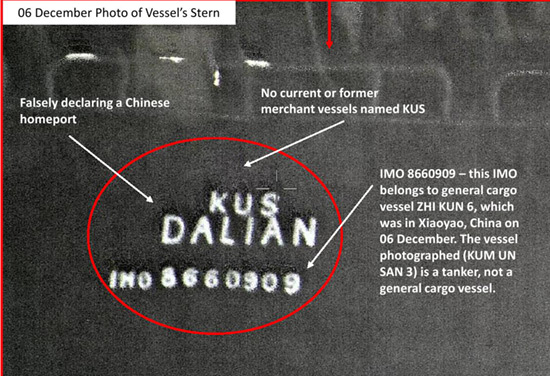
Back on November 17, the South Koreans seized KOTI, a Panamanian-registered ship that was suspected of transferring oil in mid-ocean to a North Korean ship. That didn’t stop the Office of Foreign Assets Control (“OFAC”) from adding the vessel (and the company that owns it) to the SDN list during its latest round of sanctions against North Korea, even though KOTI will likely spend its final days in Pyeongtaek before its final voyage to a South Korean scrap heap.
Now, of course, we know, thanks to very cool pictures released by OFAC when it designated KOTI, that the ship indeed transferred oil to the unfortunately named North Korean tanker KUM UN SAN 3 (apparently an anagram of A MUSK NUN), somewhere in the East China Sea. And, as the picture above, also released by OFAC, makes clear, the ship to which KOTI transferred the oil, did not identify itself as the KUM UN SAN 3 or as a North Korean vessel. According to markings on the vessel, it was a ship named KUS, sailing from Dalian, China, and registered as IMO 8660909. So how was KOTI to know that it was dealing with a wolf in sheep’s clothing, or, as we might say, a Nork in ship’s clothing?
Well, OFAC also released an advisory proposing mostly useless advice on how to avoid the North Koreans on the high seas. You know, things like read all your shipping documents. Duh. But the advice on ship-to-ship transfers is pretty useful.  Obviously, the ship offloading cargo needs to establish a legitimate commercial reason for the ship-to-ship transfer, particularly where the transfer occurs in the East China Sea. The normal commercial justifications for ship-to-ship transfers include reducing the weight of a ship so it can enter a harbor, refueling a ship, and transferring cargo to the new owner where a change in ownership has occurred at sea.  It’s going to be hard to justify an STS transfer to a North Korean ship in the East China Sea based on any of these normal commercial justifications.
More importantly, the advisory advises due diligence to determine the identity of the ship taking the transfer. And here is where Google and other online resources are your friend. Had KOTI and its shipping company checked the IMO website it would have quickly learned that IMO 8660909 belonged to a cargo ship named ZHI KUN 6 (not a tanker named KUS). It also would have learned that there was no ship named KUS. Finally, it could have used one of many marine traffic sites, such as this one, to determine the location of the ZHI KUN 6, which appears to have been elsewhere at the time of the cargo transfer.
(An interesting side note on the marine location issue. OFAC says that at the time of the STS transfer between KUS, née KUM UN SAN 3, and KOTI, the ZHI KUN 6 (the real owner of IMO 8660909) was in “Xiaoyao, China,” a location that is not know to exist anywhere in the world anymore than Emerald City, Oz or Hogsmeade Village.  There is a Xiaoyaoxiang, but it is about 20 miles inland, which would be an odd location, but who knows? In any event, ZHI JUN 6 wasn’t in the East China Sea at the time.)

 Posted by
Posted by  Category:
Category: 

![Image via https://home.treasury.gov/news/press-releases/sm0297 [Public Domain] Image via https://home.treasury.gov/news/press-releases/sm0297 [Public Domain]](https://www.exportlawblog.com/images/kum_un_san.jpg)
![SkeetIR Micro Mono Sight via https://www.baesystems.com/en-us/product/oasys-thermal-imaging-and-aiming#ske[Fair Use] SkeetIR Micro Mono Sight via https://www.baesystems.com/en-us/product/oasys-thermal-imaging-and-aiming#ske[Fair Use]](https://www.exportlawblog.com/images/skeetir.jpg)
![Visita Ilyumzhinov by Federació d'Escacs Valls d'Andorra [CC-BY-SA-2.0 (http://creativecommons.org/licenses/by-sa/2.0)], via https://commons.wikimedia.org/wiki/File:Kirsan_Ilyumzhinov_2014.jpg[cropped] Visita Ilyumzhinov by Federació d'Escacs Valls d'Andorra [CC-BY-SA-2.0 (http://creativecommons.org/licenses/by-sa/2.0)], via https://commons.wikimedia.org/wiki/File:Kirsan_Ilyumzhinov_2014.jpg[cropped]](https://www.exportlawblog.com/images/ilyumzhinov.jpg)
![Denis Chaibi via http://www.mei.edu/profile/denis-chaibi[Fair Use] Denis Chaibi via http://www.mei.edu/profile/denis-chaibi[Fair Use]](https://www.exportlawblog.com/images/chaibi.jpg)


